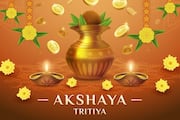Maha Shivratri 2024: Why you should offer Bilva leaves to Lord Shiva?
Bilva leaves, also known as Bel leaves, are considered sacred in Hinduism, particularly in the worship of Lord Shiva. It is believed that such offerings please Lord Shiva and bring blessings to the devotee.

The Bilva tree is believed to be the abode of numerous deities, and its leaves are said to symbolize the trinity of Brahma, Vishnu, and Mahesh (Shiva), making them inherently auspicious. Each aspect of the Bilva leaf, from its tri-foliate structure to its rough texture, holds profound spiritual significance that resonates deeply with devotees.
The ritual of offering Bilva leaves to Lord Shiva is steeped in symbolism and mythology. According to Hindu scriptures, the Bilva tree is believed to have emerged from the sweat of Goddess Parvati, the consort of Lord Shiva, during her penance to win his affection. Thus, the Bilva tree is intrinsically linked to the divine union of Shiva and Parvati, symbolizing fertility, devotion, and eternal love.
Lord Shiva is also revered as the Mahadeva (“Great God”), Mahesha (“Great Lord”), Nataraja (the cosmic dancer), Shambhu (“Benign”), Shankara (“Beneficent”), Adiyogi (the God of yoga and meditation), the Ardhanarishvara (androgynous union of Shiva and his consort in one body, half-male and half-female), the great ascetic, the Supreme Yogi, the master of fertility, the master of both poison and medicine, Pashupata (the Lord of Cattle), Kala Bhairava (Lord of times) and Rudra (the destroyer of evil and sorrow).
He who utters the names of Lord Shiva during Shivratri with perfect devotion and concentration is freed from all sins and he reaches the abode of Lord Shiva and resides very happily there. This year Maha Shivratri will be observed on March 8.
The offering of Bilva leaves is believed to have profound spiritual benefits. It is said that even a single Bilva leaf, offered with sincerity and devotion, can cleanse the soul of impurities and negative karma. The fragrance of the Bilva leaves is believed to purify the environment, creating an aura of sanctity and serenity conducive to spiritual practices and worship.
The shape and texture of the Bilva leaf are said to resemble the three eyes of Lord Shiva, with the two primary leaflets representing the eyes, and the smaller central leaflet symbolizing the third eye, the eye of wisdom and spiritual insight. Through the act of offering Bilva leaves, devotees seek to awaken the divine presence of Lord Shiva within themselves and attain spiritual enlightenment.
In temples and sacred shrines across India and beyond, the ritual of offering Bilva leaves to Lord Shiva on Maha Shivratri is performed with utmost reverence and devotion. Devotees chant sacred mantras and prayers, invoking the blessings of Lord Shiva as they lay the Bilva leaves at his feet.
Offering Bilva Patras to a Shivlinga during Mahashivratri is believed to bestow merit equal to that of a thousand Yagya sacrifices made to Shiva during Shivratri. One Neel Kamal is equal to 100 lotus flowers, and one Bel Patra is equal to 1000 Neel Kamals. So, the simplest approach to please Lord Shiva is by Bel Patra. On Maha Shivratri, offering bilva leaves to the lingam destroys even the worst karmic consequences.
















